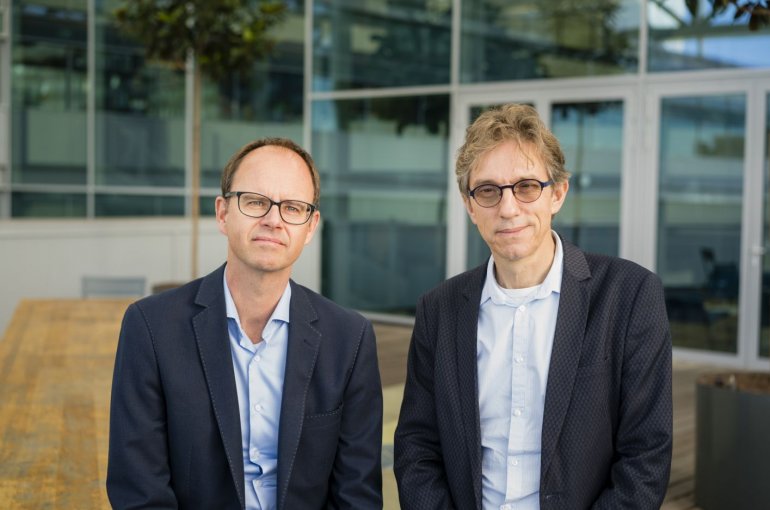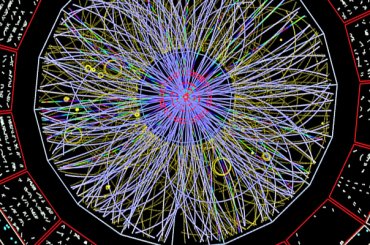Utrecht’s physics and chemistry research is ‘world leading’
Prepared for the future

The physics and chemistry research at Utrecht University is world-leading, both in its quality and its relevance. That is the conclusion of an international review committee chaired by Cambridge University Professor Frenkel. All four evaluated research institutes are in excellent shape to meet the challenges of the future, although funding for fundamental and long-term research is a point of concern. In fact, the committee believes these institutes deserve full support, due to their crucial importance in achieving the university’s strategic objectives.
After a thorough self-evaluation, department heads Henk Dijkstra (Physics) and Bert Klein Gebbink (Chemistry) were fully confident that they would receive a positive evaluation. But the fact that an international committee with such a broad perspective has emphatically granted the title ‘world leading’ makes them even more proud of the achievements by the institutes within their departments.
All institutes world leading
The result of this evaluation means that all research institutes of the two departments are among the best in their fields. Klein Gebbink remarks that earlier this year, the Science for Life review committee had already issued a similar qualification for the Bijvoet Institute. The fact that the Debye Institute for Nanomaterials Science, the Institute for Theoretical Physics (ITP), the Institute for Subatomic Physics (SAP), and the Institute for Marine and Atmospheric Research Utrecht (IMAU) have also been qualified as ‘world leading’ is an impressive feather in the departments’ cap.
Positive developments
The committee noted that the departments and the faculty have achieved several positive developments thanks to their excellent leadership. Seven years ago, the Physics department had to make difficult choices to remain financially healthy, a process that the Chemistry department had been forced to undergo some years before. But the focus that these departments maintained at the time is now paying off. Thanks in part to the Sector Plan Initiative for Physics and Chemistry and the participation in three NWO-Gravity programmes, the faculty has been able to attract and keep promising young researchers. “We’re seeing the results of that structural stimuli now”, Dijkstra explains, “because we would never have achieved this level without them.”
Changes to hiring policy
During the site visit, the committee noticed that the junior staff has the potential to become as world leading as the senior staff. A change to the faculty’s hiring policy has played an important role in this development. Academic staff are specifically selected for their potential to set up their own line of research and to acquire the necessary funding themselves. “That’s vital, otherwise you just won’t survive as a department”, says Dijkstra.
Congenial atmosphere
Employees consider the atmosphere at the faculty to be congenial, and the research environment inspiring. Also, our PhD candidates evaluate their supervision and education positively. Dijkstra is pleased with the finding that employees are praising the support provided by the Research Support Office. “I’m very satisfied with it as well, but now it’s clear to everyone that the office enjoys widespread appreciation.”
Recommendations and suggestions
The committee has also issued some recommendations and suggestions for the departments. For example, it shared the researchers’ concerns about funding for advanced research facilities, theory-based research and long-term research. Due to these concerns, the institutes’ viability has received a rating of ‘very good’ instead of ‘excellent’. Building world leading institutes is a long-term process, but the committee warns that a university can quickly lose the status due to increasing competition.
Biophysics
The committee emphasises the necessity of an active, long-term approach to achieve a more balanced male-female ratio. The ambition to increase the collaboration with Utrecht Life Sciences through initiating a biophysics research group may also contribute to the realisation of this goal.
Stepping stone
Dijkstra and Klein Gebbink are currently drafting an administrative reply to the evaluation report, describing what they intend to do with the recommendations. “This review report is a wonderful encouragement for our shared research ambitions, and a stepping stone for the next phase. We can learn from the report how we remain to be world class”, according to Klein Gebbink.
More information

Debye Institute for Nanomaterials Science
At the Debye Institute for Nanomaterials Science, chemistry and physics meet to study the properties of materials at the nanoscale. We specifically focus on three themes: Catalysis, Colloid Science and Nanophotonics.

Institute for Subatomic Physics
At the Institute for Subatomic Physics (SAP) we conduct fundamental experimental research into the building blocks of matter and the various forces acting on them.

Institute for Marine and Atmospheric Research (IMAU)
The mission of the Institute for Marine and Atmospheric Research Utrecht (IMAU) is to contribute to the basic science of the oceans, atmosphere and cryosphere.

Institute for Theoretical Physics
At the Institute for Theoretical Physics, we study physical systems on every scale, ranging from the very small - quantum correction to gravity - to the largest possible scale - the universe.

